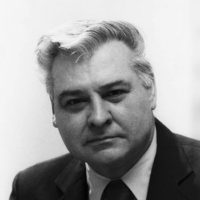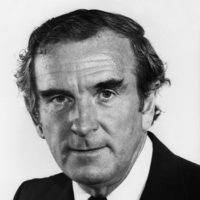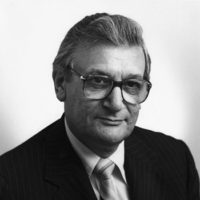
Cyril A. Clarke
The University of Liverpool

Ronald Finn
Royal Liverpool Hospital

Vincent J. Freda
Columbia University

John G. Gorman
Columbia University

William Pollack
Ortho Diagnostics
For illuminating the genetics of RH factor, and for directing essential research into hemolytic disease of the newborn.
Sir Cyril Clarke
The Rh antigen is present in all but 15 percent of white women, 4 percent of black women, and in virtually all women of other races. When an Rh-negative woman conceives a child who is Rh-positive, she can be sensitized to the antigen by fetal red blood cells escaping into her bloodstream at delivery. When she conceives another Rh-positive child, her immune system, primed by the previous pregnancy, may mount an attack against the fetus, causing severe anemia, hemorrhage, brain damage or death. After three or four pregnancies, an Rh-negative woman runs a one-in-three chance of having a child with Rh disease, which is also known as erythoblastosis or hemolytic disease of the newborn, which causes severe and irreversible abnormalities.
The genetics of Rh antigen attracted Dr. Clarke because of his avid interest in butterflies. He appreciated that the method of inheritance of certain protective wing patterns in butterflies is similar to that of Rh blood groups.
In 1958, Dr. Clarke assigned his student, Dr. Ronald Finn, to extend the studies of Dr. Philip Levine, who had observed that, when there is an ABO blood type incompatibility between mother and child, an Rh-negative mother runs a smaller risk of having a child with Rh disease.
Undaunted by the skepticism of their colleagues, Dr. Clarke and Dr. Finn showed, in a clinical trial in 1964, that anti-Rh antibody, given at delivery to an Rh-negative mother, does protect her next child from Rh disease.
To Professor Sir Cyril Clarke, for illuminating the genetics of Rh antigen and for initiating and guiding research leading to the potential conquest of hemolytic disease of the newborn, this 1980 Albert Lasker Clinical Medical Research Award is given.
For developing an anti-RH vaccine, leading to the conquest of hemolytic disease of the newborn.
Ronald Finn
In 1959, while a student with Professor Sir Cyril Clarke at the University of Liverpool, Dr. Finn began the first prospective study of the relation between ABO blood type and Rh antigen incompatibilities. By monitoring the blood of Rh-negative mothers during pregnancy and after delivery, he established that fetal red blood cells enter the mother's blood stream usually at delivery and that, when the fetus and the mother are ABO-incompatible, the mother's immune system destroys the cells before she can become sensitized to Rh antigen.
Dr. Finn postulated that if an Rh-negative mother was given anti-Rh antibody soon enough, any fetal red blood cells in her circulation would be inactivated before her immune system could become sensitized to the Rh antigen. In 1960, he was the first Rh investigator to suggest this at a scientific meeting. Using crude semen from sensitized Rh-negative donors, he showed that sensitization could be prevented in Rh-negative male volunteers. Experiments with pure anti-Rh antibody, given by American investigators who were independently pursuing similar research, confirmed these findings. In 1964, Dr. Finn and Dr. Clarke proved their point in a carefully designed clinical trial among high-risk Rh-negative women.
For his multifaceted research into the mechanism protecting the unborn child from immunologic attack during pregnancy, for discovering how the weakness of these mechanisms can lead to hemolytic disease of the newborn, and for his vital contributions to the development of the anti-Rh vaccine, this 1980 Albert Lasker Clinical Medical Research Award is given.
Vincent Freda
From his first-hand experience in delivering babies who were ill, anemic, brain-damaged or threatened with death because of Rh-incompatibility with their mothers, Dr. Freda determined as a young obstetrician to seek means of preventing Rh disease. From his mentor, Dr. Alexander Weiner, Dr. Freda acquired the insight that the disease arose from immunological origins that could be controlled once they were understood.
While searching for clues, Dr. Freda endeavored to help Rh-afflicted infants in every way possible at the time, thus becoming a pioneer in fetalogy. He established the first clinic for Rh-negative mothers, and introduced such techniques as amniocentesis and intrauterine blood transfusions in the United States.
Working with Dr. John Gorman, Dr. Freda deduced that if anti-Rh antibody were given at the time of delivery, it would block sensitization and prevent Rh disease in the woman's next Rh-positive child.
Although his colleagues scorned the idea, Dr. Freda and Dr. Gorman set out to test this brilliantly simple concept, using pure antibody supplied by Dr. William Pollack. It was tested first among volunteers at Sing Sing penitentiary, and in a limited study among previously unsensitized Rh-negative women.
It was immediately clear that the vaccine was effective and by 1964, it was evident that Dr. Freda's compassionate determination had led to an advance which could save the lives of thousands of newborn children.
To Dr. Freda, for his abiding concern for the mothers and unborn children in his care, which impelled him to seek an answer to hemolytic disease of the newborn, this 1980 Albert Lasker Clinical Medical Research Award is given.
John Gorman
As director of the blood bank at Columbia Presbyterian Hospital, Dr. Gorman worked intimately with the problems of Rh disease, performing serological and immunological tests and supplying emergency blood transfusions to babies suffering from hemolytic disease of the newborn. He was drawn into research on Rh disease by Dr. Vincent Freda, and came to share the conviction that the ravages of Rh incompatibility could be prevented by immunologic means.
In 1960, Dr. Gorman embarked on an intensive search in the blood bank and the medical library to complement Dr. Freda's clinical work. At the instigation of Dr. Freda, and supported by a small grant from the Health Research Council of New York City, Dr. Gorman set up a study of Rh disease, based on extensive records from the blood bank. From an observation by Dr. Theobald Smith many years earlier came the idea that the passive administration of an antibody to an antigen artificially prevents the expected active immune response to that antigen. Dr. Gorman suspected, therefore, that antibody-mediated immune suppression could be brought about by giving anti-Rh antibody to Rh-negative mothers.
Dr. Gorman realized that, while crude serum from sensitized Rh-negative donors could be a simple source for such antibodies, it posed the threat of hepatitis. Pure antibody, he concluded, was the only safe answer. He persuaded Dr. William Pollack to provide the antibody for testing, and to become the third member of their research partnership. For his creative and balanced insight, linking theoretical knowledge of immunology with the therapeutic development of the life-saving anti-Rh vaccine, this 1980 Albert Lasker Clinical Medical Research Award is given.
William Pollack
A bold and knowledgeable immunologist with a thorough understanding of the new technology for fractionating serum into its constituents, Dr. Pollack prepared and supplied to Dr. Vincent Freda and Dr. John Gorman the gamma globulin containing anti-Rh antibodies, which was essential to the clinical tests leading to the prevention of Rh disease. At the same time, Dr. Pollack devised refinements in the fractionating process to obtain the anti-Rh antibodies.
In a gesture epitomizing the spirit of disinterested scientific cooperation, Dr. Pollack supplied pure antibody to Dr. Ronald Finn, who was independently pursuing similar research in Liverpool.
In later research, Dr. Pollack pursued the provocative questions raised by the success of the vaccine, showing that the passive administration of anti-Rh antibodies acts upon an intricate feedback system controlling antibody production. Today, anti-Rh vaccine is manufactured by Ortho Diagnostics Inc., and marketed under the trade name RhoGAM. Before the vaccine was developed, 10,000 babies died of Rh disease in the United States alone. This disease could be conquered if every Rh-negative woman received the vaccine when needed.
To Dr. Pollack, for contributing his immunologic expertise and his knowledge of the fractionation of human serum to the development of anti-Rh vaccine, this 1980 Albert Lasker Clinical Medical Research Award is given.
